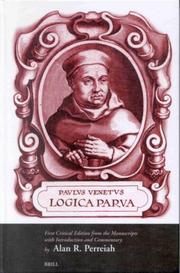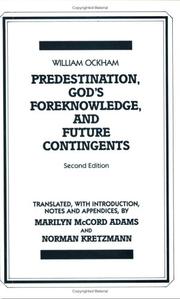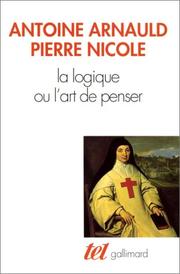| Listing 1 - 10 of 82 | << page >> |
Sort by
|
Book
Year: 1984 Publisher: Dordrecht Boston Lancaster Reidel
Abstract | Keywords | Export | Availability | Bookmark
 Loading...
Loading...Choose an application
- Reference Manager
- EndNote
- RefWorks (Direct export to RefWorks)

ISBN: 9004123652 9004453385 9789004123656 9789004453388 Year: 2002 Publisher: Leiden: Brill,
Abstract | Keywords | Export | Availability | Bookmark
 Loading...
Loading...Choose an application
- Reference Manager
- EndNote
- RefWorks (Direct export to RefWorks)
The most widely read logic book in fifteenth-century Italy, Logica Parva was copied in more than 80 manuscripts and 25 editions. By transmitting Oxford logic to Italy it influenced the development of logic, science and philosophy in the Renaissance. This first critical edition from the manuscripts locates the Logica Parva within the tradition of late medieval logic and semantics. The Introduction gives an inventory of all manuscripts of the Logica Parva and an extensive Commentary analyzes the work's key terms and concepts.
Logic --- Early works to 1800. --- Logic - Early works to 1800
Book
ISBN: 9780268035358 0268035350 Year: 2015 Publisher: Notre Dame (Ind.): University of Notre Dame press,
Abstract | Keywords | Export | Availability | Bookmark
 Loading...
Loading...Choose an application
- Reference Manager
- EndNote
- RefWorks (Direct export to RefWorks)
The thirteenth-century logician Lambert of Auxerre was well known for his Summa Lamberti, or simply Logica, written in the mid-1250s, which became an authoritative textbook on logic in the Western tradition. Our knowledge of medieval logic comes in great part from Lambert's Logica and three other texts: William of Sherwood's Introductiones in logicam, Peter of Spain's Tractatus, and Roger Bacon's Summulae dialectics. Of the four, Lambert's work is the best example of question-summas that proceed principally by asking and answering questions on the subject matter. Thomas S. Maloney's translation of Logica, the only complete translation of this work in any language, is a milestone in the study of medieval logic. More than simply a translation, Maloney's project is a critical, comprehensive study of Lambert's logic situated in the context of his contemporaries and predecessors. As such, it offers a wealth of annotation and commentary. The lengthy introduction and extensive notes to the text explain the origin, theoretical context, and intricacies of the text and its doctrines. Maloney also addresses the disputed issues of authorship, date, and place of publication of the Summa Lamberti and makes available to the English-only audience the French, German, and Italian secondary sources--all translated--that are needed to enter the discussion.
Logic --- Philosophy, Ancient --- Philosophy, Medieval --- Logic - Early works to 1800
Book
ISSN: 11692936 ISBN: 9782745322654 2745322656 Year: 2011 Volume: 108 Publisher: Paris: Champion,
Abstract | Keywords | Export | Availability | Bookmark
 Loading...
Loading...Choose an application
- Reference Manager
- EndNote
- RefWorks (Direct export to RefWorks)
Logic --- Logique --- Early works to 1800. --- Ouvrages avant 1800 --- Logic - Early works to 1800 --- Rhétorique

ISBN: 091514414X 0915144131 9780915144136 9780915144143 Year: 1983 Publisher: Indianapolis, Ind.: Hackett,
Abstract | Keywords | Export | Availability | Bookmark
 Loading...
Loading...Choose an application
- Reference Manager
- EndNote
- RefWorks (Direct export to RefWorks)
Predestination --- Logic --- Early works to 1800 --- Predestination - Early works to 1800 --- Logic - Early works to 1800
Book
ISBN: 4998062212 9784998062219 Year: 1999 Volume: 2 Publisher: Tokyo: Soka university. International research institute for advanced buddhology,
Abstract | Keywords | Export | Availability | Bookmark
 Loading...
Loading...Choose an application
- Reference Manager
- EndNote
- RefWorks (Direct export to RefWorks)
Buddhist logic --- Early works to 1800 --- Buddhist logic - Early works to 1800
Book
ISBN: 0936770074 9770100455 9789770100455 9780936770079 Year: 1982 Volume: 1, a (5) Publisher: Cairo: General Egyptian book organization,
Abstract | Keywords | Export | Availability | Bookmark
 Loading...
Loading...Choose an application
- Reference Manager
- EndNote
- RefWorks (Direct export to RefWorks)
Logic --- Aristotle. --- Aristoteles. --- Logic - Early works to 1800. --- Aristotle. - Posterior analytics.
Book
ISBN: 9780199669585 0199669589 Year: 2014 Publisher: Oxfird: Oxford university press,
Abstract | Keywords | Export | Availability | Bookmark
 Loading...
Loading...Choose an application
- Reference Manager
- EndNote
- RefWorks (Direct export to RefWorks)
For nearly four centuries, when logic was the heart of what we now call the "undergraduate curriculum," Peter of Spain's Summaries of Logic (c. 1230) was the basis for teaching that subject. Because Peter's students were teenagers, he wrote simply and organized his book carefully. Since no book about logic was read by more people until the twentieth century, the Summaries has extensively and profoundly influenced the distinctly Western way of speaking formally and writing formal prose by constructing well-formed sentences, making valid arguments, and refuting and defending arguments in debate. Some books, like the Authorized Version of the English Bible and the collected plays of Shakespeare, have been more influential in the Anglophone world than Peter's Summaries--but not many. This new English translation, based on an update of the Latin text of Lambertus De Rijk, comes with an extensive introduction that deals with authorship, dating, and the place of the Summaries in the development of logic, before providing a chapter-by-chapter analysis of Peter's book, followed by an analysis of his system from the point of view of modern logic. The Latin text is presented on facing pages with the English translation, accompanied by notes, and the book includes a full bibliography.
Logic --- Logique --- Early works to 1800. --- Ouvrages avant 1800 --- John --- Logic - Early works to 1800
Digital
Abstract | Keywords | Export | Availability | Bookmark
 Loading...
Loading...Choose an application
- Reference Manager
- EndNote
- RefWorks (Direct export to RefWorks)
Philosophy -- Early works to 1800 --- Logic -- Early works to 1800 --- Metaphysics

ISBN: 2070727262 9782070727261 Year: 1992 Volume: 211 Publisher: Paris : Gallimard,
Abstract | Keywords | Export | Availability | Bookmark
 Loading...
Loading...Choose an application
- Reference Manager
- EndNote
- RefWorks (Direct export to RefWorks)
Logic --- Logique --- Early works to 1800 --- Ouvrages avant 1800 --- Logic [Modern ] --- 17th century --- Logic - Early works to 1800
| Listing 1 - 10 of 82 | << page >> |
Sort by
|

 Search
Search Feedback
Feedback About UniCat
About UniCat  Help
Help News
News